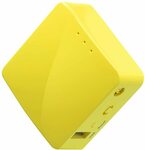Feed your inner geek some (more) Mango 😉
OK nobody is travelling, but these things have a lot more uses than just that.
Sadly shipping is causing issues with supplies into Australia of other models (e.g. AR750s) and the $AUD isn't that strong at the moment (before people start complaining that it's more expensive than last time, welcome to the Covid19 economy 🙄 )
Cashback with Cashrewards or Shoprewards
The GL-MT300N-V2 supports full OpenWRT, multiple modes and the USB 5V 1A power input gives you heaps of options to power (from notebook, phone charger, powerbank) for remote applications.
New firmware 3.100+ supports TOR in the standard interface
Check previous posts for usage cases, questions etc.
MINI TRAVEL ROUTER: Convert a public network(wired/wireless) to a private Wi-Fi for secure surfing. Tethering, 3G/4G USB Modem Compatible. Powered by any laptop USB, power banks or 5V DC adapters (sold separately). 39g (1.41 Oz) only and pocket friendly.
OPEN SOURCE & PROGRAMMABLE: OpenWrt pre-installed, USB disk and WebCam extendable.
LARGER STORAGE & EXTENDABILITY: 128MB RAM, 16MB Flash ROM, dual Ethernet ports, UART and GPIOs available for hardware DIY.
OPENVPN CLIENT & TOR: OpenVPN client pre-installed, compatible with 20+ VPN service providers. TOR firmware available for downloading.
PACKAGE CONTENTS: GL-MT300N-V2 mini router (1-year Warranty), USB cable, User Manual.
Couple of things here that maybe useful (in no particular order):
*If you use as a WISP repeater then you WILL lost 50% of your bandwidth as the 2.4Ghz channel is shared between WISP/WAN and LAN. If you want to avoid this better to look at a dual band travel router like the AR750S and WISP on one band and WiFI LAN on the other
*Supports out of the box OpenVPN and Wireguard Server and Client and with the latest firmware TOR client.
*VPN access on/off can be controlled by a physical on/off switch. So you could connect to the Mango WiFi "normally" and when you want to you can flick the switch to turn on the VPN. I have a Mango as part of my network that only some of MY devices attach to so not everyone on the network is affected.
*Via the web interface you can switch VPNs. I have a Wireguard client back to my home router server for security and Australian internet access but also have 3 OpenVPN countries setup on Nord/Pure for geographical VPN. It's easy as dragging a CFG file into the interface to setup and the web interface lets you change between them
*One thing that isn't mentioned is the security implications on connecting to an open network. You end up with your own firewalled, subnetted network (This is why Chromecast will work on a hotel captive portal network)
*While default is 1 WAN and 1 LAN ethernet, if you are using WISP you can change to 2 LAN ports
*Because it's OpenWRT based you can add any of the packages out of the OpenWRT repository. I have run VPNS, AdBlock, Transmission Torrent downloads to the USB stick connected etc
*It can also be used as an AP or repeater. Handy because of it's size
*5V/1A means you can run off a phone power pack, modern PC/Tablet USB port, Car 5V adapter or powerbanks. I'll often sit in an internet cafe with the Mango connected to a USB port on my notebook and WISP connect to the free WiFi for security.
*It is never going to be the fastest or strongest WiFi box out there.
*Because of it's lower power consumption one of my projects I want to do is a geocache out in the bush. Mango+powerbank+solar cell in a waterproof container. You can create a captive portal on it which will be used to present a web page to the final cache destination.
*Full LUCI interface can still be accessed outside of the Gl.iNet wrapper
*Note that this is using Mediatek proprietary network drivers.
*There are alternative firmwares out there - Native OpenWRT, RooTer…..
*If you're on holidays with the family you can configure all your devices to attach to the Mango and as you move from free WiFi to free Wifi you don't have to reconnect all their devices just the Mango once. You can put a USB stick on it to share music/movies/photos (or in a car, or on a plane) even without an internet connection.
*You can connect a 4G USB Dongle to it (as long as it's supported by OpenWRT) or USB tether you mobile to it and use as a router to share the LTE.
*Because the router presents itself as a device to the network, and all connected devices to the Mango present as the Mango (if that makes sense), gets around restrictive WiFi networks where you can only have a limited number of devices. Useful too if you're paying for per device.
*It's a great small and versatile unit. It won't suit everyone or every circumstance, but if you've got a use for it they're a great jigger :)




 CamelCamelCamel
CamelCamelCamel

Thanks for the comprehensive post. I've been meaning to have a play with one of these for a while now, finally pulled the trigger.